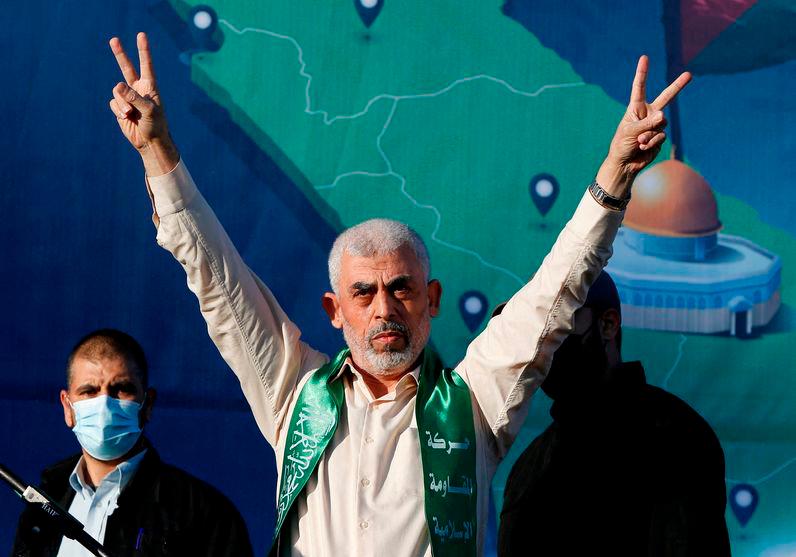CAIRO: Hamas named its Gaza leader Yahya Sinwar as successor to former political chief Ismail Haniyeh, who was assassinated in Tehran last week, the group said on Tuesday, in a move that reinforces the radical path pursued since the Oct. 7 attack on Israel.
Sinwar, the architect of the most devastating attack on Israel in decades, has been in hiding in Gaza, defying Israeli attempts to kill him since the start of the war.
“The Islamic Resistance Movement Hamas announces the selection of Commander Yahya Sinwar as the head of the political bureau of the movement, succeeding the martyr Commander Ismail Haniyeh, may Allah have mercy on him,“ the movement said in a brief statement.
News of the appointment, which came as Israel braces for a likely attack from Iran following the killing of Haniyeh in Tehran, was greeted with a salvo of rockets from Gaza from the bands of militants still fighting Israeli troops in the besieged enclave.
“The appointment means that Israel needs to face Sinwar over a solution to Gaza war,“ said a regional diplomat familiar with the talks brokered by Egypt and Qatar, which are aimed at bringing a halt to the fighting in Gaza and a return of 115 Israeli and foreign hostages still held in the enclave.
“It is a message of toughness and it is uncompromising.”
Sinwar, who spent half his adult life in Israeli prisons, was the most powerful Hamas leader left alive following the assassination of Haniyeh, which has left the region on the brink of a wider regional conflict after Iran vowed harsh retaliation.
Israel has not claimed responsibility for the assassination but it has said it killed other senior leaders, including Hamas deputy leader Saleh al-Arouri, who was killed in Beirut, and Mohammed Deif, the movement's military commander.
Born in a refugee camp in the southern Gaza city of Khan Younis, Sinwar, 61, was elected as Hamas' leader in Gaza in 2017 after gaining a reputation as a ruthless enforcer among Palestinians and an implacable enemy of Israel.
Israel's chief military spokesman, Rear Admiral Daniel Hagari, blamed Sinwar for the Oct 7 attack and said Israel would continue to pursue him.
“There is only one place for Yahya Sinwar, and it is beside Mohammed Deif and the rest of the Oct 7th terrorists,“ he told Al-Arabiya television, according to a statement released by the military. “That is the only place we’re preparing and intending for him.”
CEASEFIRE TALKS
In a sign that the movement had united around the choice of Sinwar, Khaled Meshaal, a former leader who had been seen as a potential successor to Haniyeh, was said by senior sources in the movement to have backed Sinwar “in loyalty to Gaza and its people, who are waging the battle of the Flood of Al-Aqsa”.
For Israel, the appointment confirms Hamas as a foe dedicated to its destruction and is likely to reinforce Prime Minister Benjamin Netanyahu's insistence that Israel must pursue its campaign in Gaza to the end.
The White House declined to comment on Sinwar's appointment. But a person familiar with Washington's thinking said the selection suggested that Hamas could toughen its position in ceasefire negotiations and make it harder to reach a deal.
They added, however, that Israel was already aware that even before his formal appointment Sinwar would have the final word on any agreement to halt the fighting, and the announcement merely set the seal on that.
Ten months since the surprise attack by thousands of Hamas-led fighters who swarmed into Israeli communities around the Gaza Strip in the early hours of the morning of Oct. 7, the war has turned the Middle East on its head and threatened to spiral into a wider regional conflict.
Some 1,200 Israelis and foreigners were killed and more than 250 taken hostage into Gaza. In response, Israel launched a relentless campaign that has so far killed almost 40,000 Palestinians and left the densely populated enclave in ruins.
Attempts at reaching a ceasefire that would give the exhausted population a respite and enable the hostages remaining in captivity to be brought home have foundered amid mutual recriminations from Hamas and Israel.
Hamas official Osama Hamdan told Al Jazeera that the movement remained committed to reaching a deal and the team that handled the negotiations under Haniyeh would continue under Sinwar, who he said was following the talks closely.
But Hani Al-Masri, a political analyst in Ramallah, said Sinwar's appointment to lead the movement overall was a direct challenge to Israel, and sent a message about Hamas’ adherence to his “extremist and resistant approach”.
“As Sinwar manages the negotiations, he will manage the movement,“ he said. (Additional reporting by Nidal al-Mughrabi in Cairo, Ali Sawafta in Ramallah, James Mackenzie in Jerusalem, Matt Spetalnick in Washington; writing by James Mackenzie; Editing by William Maclean and Jonathan Oatis)









